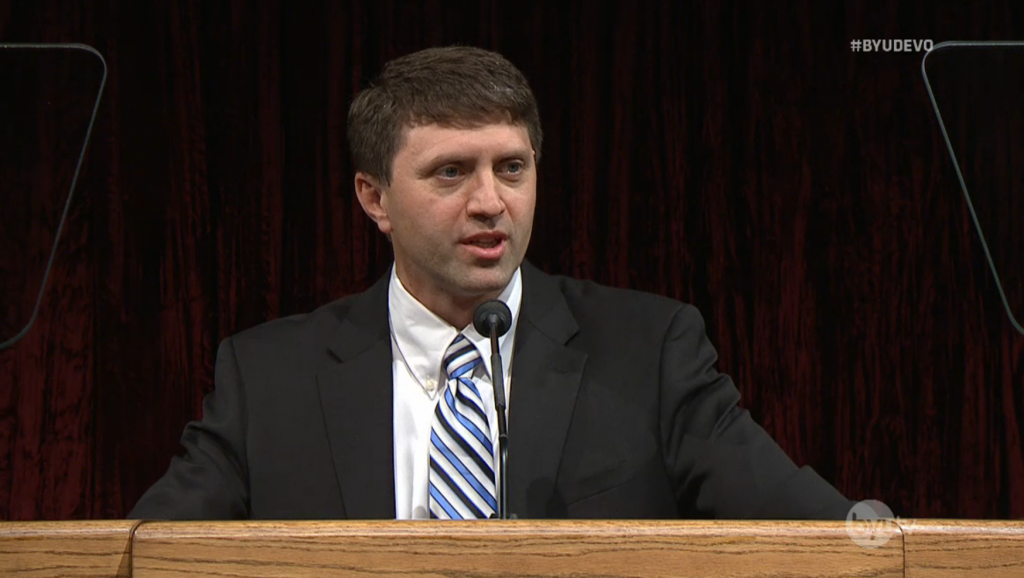
BYU ancient scripture professor Kerry Muhlestein spoke to BYU students about being wholeheartedely holy at BYU’s Devotional May 12.
Muhlestein began by talking about his love of water-skiing. He said that for one year, his brothers and he went water-skiing every month of the year — even in January and February.
“The way I read the accounts of the Savior and Peter on the Sea of Galilee, it seems to me that water-skiing is the closest thing we have to a celestial sport. I can’t get enough of it,” Muhlestein said.
Muhlestein often teaches people how to water-ski. He explained that beginners often make the mistake of trying to pull on the rope to raise themselves out of the water when the boat begins to pull them. However, this ultimately makes them fall down.
“When they learned to forget about using their own strength to get up, but relied on the power of the boat, they would ski,” Muhlestein said.
Muhlestein compared this to the Israelites, who wanted to worship both Jehovah and idols. He referenced a scripture from the Old Testament in which Elijah warned the Israelites against “halting” between two options. Halting means to limp between two options, according to Muhlestein.
“In effect, by relying on something in addition to Jehovah, they were pulling their legs out from under themselves just as did those who were trying to learn to water-ski but relied on their own strength,” Muhlestein said.
Muhlestein suggested that often people look back to the Israelites and wonder how they could worship idols. He proposed that people do the same thing today.
“Our task is not to ask ourselves ‘if’ but ‘how’ we do the same thing. I believe there is no doubt that we worship more than one god,” Muhlestein said. “We tend to worship the ideas of the world, and, like those who pull on the water-ski rope, we don’t even realize we’re doing it.”
Muhlestein illustrated an example from when he taught world civilizations. The class would discuss human sacrifice in the ancient Meso-American culture. When he outright asked if the ritual sacrifices were bad, the students quickly condemned it.
When he asked what they thought about this element of culture, though, nearly no student would say anything negative about it. He attributed this to the fact that they had been taught to be tolerant of other cultures.
“Tolerance is a wonderful virtue. But for it to be a virtue, tolerance must be felt and practiced in God’s way, not the world’s,” Muhlestein said. “When we try to practice Godly virtues in the way the world wants us, then we are halting between two options. We are doing our own version of worshiping Jehovah and Ba’al at the same time.”
Another way in which people worship both God and worldly idols is by doing the right things but for worldly reasons, according to Muhlestein.
“Typically we start out wanting to do well at our jobs, do well at school, do good things in the community, learn to play the piano or sing, and so on,” Muhlestein said. “As the world lauds these accomplishments, it usually doesn’t take long until we start to use worldly standards and measure success by how well we do at work or what kinds of degrees we have.”
This is also half-hearted worship, according to Muhlestein. He suggested that people are wholeheartedly holy when they worship only God. He suggested five ways to avoid worshiping both God and idols.
The first step was accepting that followers of God must think differently than the world.
“As we hobble ourselves by following both the ideas of God and the world, the conflict between these competing ideas will sooner or later create some kind of crisis,” Muhlestein said. “Listening to the world is akin to pulling on the waters-ski rope of life, and the only result is that we will fall flat on our backs.”
The second step was asking what worldly influences they cling to and eliminate them.
Muhlestein said a regular evaluation is necessary to determine where students stand, especially in moments of crisis.
The third step was using the Spirit to distinguish which thoughts are influenced by God and which are influenced by Satan.
“We must also be careful that we are neither blinded by the mists of Satan’s sophistries, nor so afraid of those mocking from the great and spacious building, that we let our opinions be set by others rather than by the true doctrines of God,” Muhlestein said.
The fourth step was keeping the companionship of the Spirit in order to maintain a holy perspective.
“Left to your own fallen devices, you can only think and see from the world’s fallen perspective,” Muhlestein said. “You will need the help of God to see things as he would have you see them.”
He also cautioned students against using their busy schedules as an excuse to avoid activities that would bring the Spirit into their lives.
The fifth step was when struggling with something that seems to conflict with what God has said to remember the times they have felt the Spirit.
“We will not feel the Spirit at all times, and sometimes when we are not, the mocking fingers of the world will hurt and hurt deeply,” Muhlestein said. “But at those moments, we most remember that we have felt God teach and testify to us of eternal truth and impart of his ideas, and then we must hold fast to those ideals.”
Muhlestein said people will be sanctified and grow closer to God by doing these five steps.
“With his help, eventually we will become the kinds of beings that are capable of thinking and feeling just as he does,” Muhlestein said.




